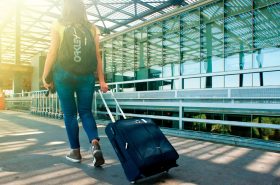Nesta época de férias, a Flórida fica repleta de brasileiros aproveitando as diversas oportunidades de compras e diversões. Porém, muitos tiveram seus planos frustrados – uma negativa no consulado americano no Brasil muitas vezes é um muro invisível que separa o brasileiro do sonho de passear em Orlando. A pergunta que sempre recebemos é: por que isso acontece e como reverter a situação?
O visto de turista, também conhecido como B2, é o que se chama de visto não-imigrante: ou seja, um visto para vir passear e voltar, sem imigrar em definitivo para o país. O que acontece, porém, é que um artigo da lei federal de imigração cria uma barreira que para muitos se torna quase intransponível. A seção 214 (b) das Leis de Imigração (INA) afirma que “Presume-se que todo estrangeiro é um imigrante até que ele estabeleça, de maneira satisfatória para o oficial consular, no momento do pedido do visto, que ele se qualifica para um visto não-imigrante”. Assim, o imigrante tem dois passos importantes a cumprir: (1) o primeiro, demonstrar que se qualifica para o visto de turista (ex: não tem crimes que o desqualifiquem, não possui deportações ou violações às leis imigratórias etc.); (2) e o segundo, conseguir reverter a tal da “presunção” imigratória, que basicamente o considera “culpado” até que prove o contrário.
Ou seja, o brasileiro que deseja obter o visto de turista precisa provar que possui laços fortes com o Brasil, que sirvam de garantia do seu regresso: um bom trabalho, estudos, família, propriedades etc. Uma pessoa que teve seu caso negado por causa dessa presunção pode tentar refazer seu pedido de visto, dessa vez com evidências mais robustas, incluindo tudo o que possa ligá-lo ao Brasil, incluindo planos de saúde, automóveis etc. Nota-se que cartas-convites e declarações de familiares não ajudam nada para esse fim.
Sabe-se que, infelizmente, muitos oficiais consulares julgam pela aparência e simplesmente negam o caso, sem olhar. Isso contradiz diretamente as diretrizes da lei – todavia, o estrangeiro fica sem recursos de apelação, pois não tem direito de processar o governo em corte nos Estados Unidos. Assim, o brasileiro com seu caso negado tem apenas dois recursos: contatar o departamento “LegalNet” do Departamento de Estado americano, que faz uma revisão superficial de certos pedidos, em que se alega erro legal ou fatual; ou tentar refazer sua petição.
Finalmente, lembramos que muitos brasileiros recorrem a agências de turismo ou despachantes para protocolar a petição do visto de turista junto ao consulado americano, sendo que isso tem causado problemas seríssimos. Muitos desses prestadores de serviço cometem erros no formulário, deixando de incluir dados importantes (como algum processo criminal ou visitas anteriores aos Estados Unidos), e pior: não incluem seus nomes e contato como os “preparadores” do formulário e enviam para o consulado como se fossem o próprio requerente. Temos visto muitos casos nos quais o consulado americano ou as autoridades do aeroporto proíbem a entrada do brasileiro, alegando que este cometeu fraude na aplicação do visto, devido a omissões ou discrepâncias. E essa situação não se corrige apenas com um “eu não sabia”. Mesmo porque é o nome do próprio estrangeiro que aparece assinando o documento, e não o do prestador de serviço.
Assim, levar a sério todo o processo de aplicação para o visto, desde o formulário até as evidências de laços fortes com o Brasil, garantem melhores chances de sucesso.



